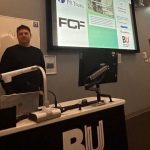Exams are almost certainly the worst part of education, hands down. They make you stress and revise for so long that by the end you feel like you have been revising forever. But there are some simple ways to make your life easier when dealing with exams. So, here are some revision tips that will hopefully keep you on the straight, and get those grades!
What type of learner are you?
If you already know, great, you should already be revising in a way which best suits your learning style. If not, go find an online test and find out (there are plenty of good ones). The way you learn greatly affects the way you should revise.
There are three main types of learner, and each learns best in a different way:
 Visual learners – these people learn by seeing a thing. So they learn by watching programmes or reading their textbooks. Highlighting and colour is also your friend.
Visual learners – these people learn by seeing a thing. So they learn by watching programmes or reading their textbooks. Highlighting and colour is also your friend.
Auditory learners – these people learn by hearing a thing. So they would learn best by listening to lectures or radio programmes. If you can’t record your lectures, record your notes yourself and listen back while cleaning the house, or while you are just chilling.
Kinaesthetic learners – these people learn by doing a thing. They learn best by hands on experience, such as building something or writing out notes. Make
posters with lots of colour and pictures, write out your notes. Colour is also your friend.
Ok, so you know what type of learner you are, and you have some basic ways of revising. So, what next? Well it depends on you. Some people like to timetable out exactly what they are going to do that day (so 11-12 revising maths). If you like to do this, excel is your friend. Colour code each unit or topic, and make sure you evenly balance your day. Also don’t try and do too much, you will just stress yourself out more. A 10- 5 work day is good (with an hour for lunch).
If you prefer to have a bit more flexibility in your schedule, set yourself a timer. EXAMPLE: 30 minutes revision on English. Then 10 minutes break. Make sure you get up and do something else during your break. Also be  aware that this method needs to be kept in check. Write up a to do list of the topics you are going to cover for the day, and make sure you actually do them.
aware that this method needs to be kept in check. Write up a to do list of the topics you are going to cover for the day, and make sure you actually do them.
However you do it, make sure you have a set amount of work to do in the day, but nothing too extensive that you can’t complete it. Then, once everything on your timetable or to do list is ticked off, stop. It is important to remember that you aren’t a machine. At the end of the working day you stop and then have some you time. Taking a hot bath and having a hot drink of your choice is surprisingly effective in de-stressing (believe it or not!).
All that’s left is to wish you good luck!
By Amy Potts










How to prepare for ODP maths exam, please????
Hello! Thanks for your enquiry. Please don’t worry, the Admissions Team confirm there are no tests/exams before the interview for ODP. Hope this helps. Warm regards askBU.